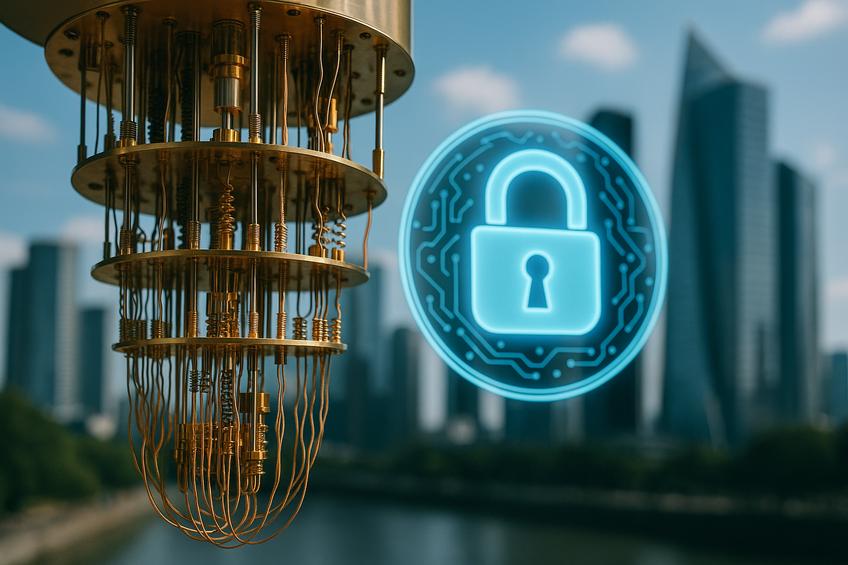Understanding Quantum Computing and Its Principles
Quantum computing represents a revolutionary advancement in computing technology, leveraging principles of quantum mechanics to process information in fundamentally different ways than classical computers. At its core, quantum computing utilizes three key quantum principles: superposition, entanglement, and interference. Superposition allows quantum bits (qubits) to exist in multiple states simultaneously, unlike classical bits which are either 0 or 1. Entanglement creates strong correlations between qubits, enabling complex computations across distributed states. Interference is used to amplify correct computation paths while canceling out incorrect ones, enhancing problem-solving efficiency. These principles enable quantum computers to solve certain problems exponentially faster than traditional computers, promising significant innovations across various sectors. Quantum computing is poised to transform IT security by both challenging existing encryption methods and enabling new, more secure cryptographic techniques according to EE Times.
The Threat to Current Encryption Standards
Quantum computing poses significant challenges to current encryption methods and cybersecurity protocols. Traditional encryption algorithms, such as RSA and Elliptic Curve Cryptography (ECC), rely on the computational difficulty of problems like factoring large integers and solving discrete logarithms. Quantum computers, leveraging algorithms like Shor’s algorithm, could solve these problems exponentially faster than classical computers, rendering these encryption schemes vulnerable. This potential vulnerability means that data protected today by strong cryptographic methods might be decrypted in the future once large-scale, reliable quantum computers become available. Consequently, there is an emerging risk of "harvest now, decrypt later" attacks, where adversaries intercept and store encrypted communications now, intending to decrypt them in the future with quantum capabilities from the Identity Management Institute.
Preparing for a Quantum-Enabled Cybersecurity Landscape
The emergence of quantum computers is revolutionizing cybersecurity strategies and practices, driven by the unique capabilities and threats posed by quantum technology. Organizations and experts recognize the urgency of preparing for a quantum future. A recent survey revealed that 63 percent of respondents believe quantum computing will increase or shift cybersecurity risks, with over half anticipating new business challenges, including regulatory and compliance changes. To counteract quantum-related threats, it is essential for cybersecurity strategies to emphasize the adoption of quantum-resistant algorithms designed to resist quantum attacks according to ISACA.
Best Practices for Quantum-Safe Data Protection
As organizations prepare for the era of quantum computing, safeguarding sensitive data requires adopting quantum-safe encryption techniques that can withstand quantum attacks. Best practices to protect your data include:
- Implementing post-quantum cryptography algorithms, such as lattice-based schemes like Kyber or hash-based signatures, which are designed to be resistant to quantum decryption methods.
- Using hybrid cryptographic protocols that combine classical and quantum-resistant algorithms, ensuring secure key exchanges and encryption.
- Employing symmetric encryption algorithms with sufficiently large key sizes — AES-256 or higher is currently considered quantum-safe, whereas AES-128 is vulnerable.
- Regularly updating cryptographic libraries and protocols to incorporate the latest standards in quantum-resistant encryption as they emerge from research and standardization bodies.
- Engaging with managed IT security providers to assess quantum risks and implement tailored quantum-safe security frameworks.
By proactively adopting these quantum-safe practices, organizations can future-proof their data security against the rise of quantum computing threats in Cisco's research blog.
Urgency of Transitioning to Quantum-Safe Solutions
Research conducted by KPMG, in cooperation with Germany's Federal Office for Information Security, highlights that 95 percent of respondents consider quantum computing’s impact on existing cryptographic security to be very high or high, yet only 25 percent of organizations have started to integrate countermeasures into their risk management strategies. This indicates an urgent need for proactive adoption of quantum-resistant encryption algorithms and forward-looking security architectures to safeguard digital assets effectively. Organizations must begin preparing now by investing in quantum-safe cryptography, continuous security assessments, and leveraging expert managed IT services that stay ahead of evolving threats according to KPMG research.
Conclusion
Understanding the implications of quantum computing on cybersecurity is vital for organizations aiming to future-proof their security measures. Preparing for this transformative technology now can save businesses from significant vulnerabilities associated with quantum attacks. To enhance your cybersecurity posture, explore our comprehensive website security solutions and our Zero Trust Security guide.
Sources
- Identity Management Institute - Quantum Computing and Cyber Attack Implications
- ISACA - Quantum Computing Poses Major Cybersecurity Risks as Few Firms are Ready
- KPMG - Quantum Computing's Cybersecurity Impact
- Cisco - Post-Quantum Cryptography: The Path to Becoming Quantum-Safe
- EE Times - Physical Principles Underpinning Quantum Computing





